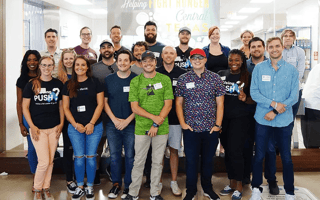The average day of a customer success manager (CSM) involves finding solutions to a mountain of client requests. But instead of tackling these issues when they arise, CSMs should plan ahead so they’re ready to solve problems before they occur.
So what does it take to make this a reality? For Amanda Wong, senior customer success manager at Miro, it’s understanding the product itself and drawing on data, which empowers her team to anticipate issues and stay on target.
But that’s not the only strategy CSMs can take to optimize client relations. At Ontic, VP of Client Experience Amy Sullivan and her team make it a priority to understand clients’ goals before they even begin using their product, which makes it easier to incorporate feedback more effectively.
“By ensuring we're clear on the outcome, we can help steer those conversations more productively,” she said.
While there may not be a one-size-fits-all approach to customer success, there are plenty of ways for CSMs to stay ahead of the game. Built In Austin checked in with Wong, Sullivan and another local CSM to learn how they have taken a more proactive approach to customer success.
Miro’s whiteboard platform allows remote teams to collaborate in real time.
What's one personal habit you've adopted that's helped you be more proactive as a CSM?
I make time to test features and document various product behavior. While we have some documentation, going through the flows myself ensures complete understanding, which empowers me to be as consultative with my clients as possible. Each customer has unique needs around implementation. After conducting thorough discovery, being knowledgeable about the product enables me to quickly architect a solution without having to spend time reaching out to others or searching for answers. Understanding the product also allows me to properly anticipate various implications and speak to change management pieces, positioning me as a trusted advisor.
What role does data play in helping you and your team be more proactive in your approach to customer success?
Data is extremely important in helping our CSMs drive the right engagement at the right time. We have reporting on where the customer is in onboarding, how many paid licenses have been activated and more. Knowing where a client is in their customer journey allows us to dig in deeper to create moments of value. For onboarding customers, that may be providing additional hands-on guidance on the next implementation steps. For customers who have low activation, another co-lead training with an internal champion may be the key to generating more momentum. Data keeps us on target and helps us get ahead with customers so we're not simply reacting to issues.
Knowing where a client is in their customer journey allows us to dig in deeper to create moments of value.”
As a team, what's a system or strategy you've put in place to get ahead of potential issues before they arise, and what other teams help support this strategy?
CSMs partner closely with an account manager (AM) to manage each client relationship. CSMs drive product adoption, advise on best practices and facilitate training initiatives while AMs lead the commercial conversations. Because we may work on separate projects with different proofs of concept, it's critical that we operate in lockstep, so we have weekly pod syncs to stay updated on our accounts. This ensures alignment across all parties, helps us drive consistent messaging and sets proper expectations with our customers. In doing so, we mitigate the risk of issues and always have a runway to plan for anything that might go wrong.
Ontic’s software helps companies proactively and continually assess, collaborate and act on physical threats.
What's one personal habit you've adopted that's helped you be more proactive as a CSM?
Each day, the success team focuses on understanding a client’s desired outcomes using our technology. By honing in on what the clients are really looking to accomplish before they ever even log into the platform, we ensure we are always keeping the end game in mind with every interaction. In our space, we’re constantly faced with understanding how to keep people safe. The success manager's job is to understand the why behind every request so that we can work with our partners in product and development to be sure we are not only incorporating feedback but truly helping solve critical problems. By ensuring we're clear on the outcome, we can help steer those conversations more productively.
Sullivan Recommends a Narrow Approach, Asking Clients to Focus on:
- Common scenarios they experience as professionals
- Key metrics their team measures
- The primary outcomes they're hoping to achieve
What role does data play in helping you and your team be more proactive in your approach to customer success?
Data is central to everything we do. We are constantly looking at client health metrics to determine where we can help them get more out of their investment in Ontic. We look at four core areas in our approach to driving client value: adoption, engagement, expansion, and renewal. These data points are available to the whole team via dashboards that we review regularly. By looking at aggregated data, we can determine where clients are clearly using Ontic to mature their programs and where others need more guidance.
We look at four core areas in our approach to driving client value: adoption, engagement, expansion, and renewal.”
As a team, what's a system or strategy you've put in place to get ahead of potential issues before they arise, and what other teams help support this strategy?
We recently instituted cross-functional quarterly account planning, and it has been highly beneficial to our teams. On a rolling basis, the success manager (SM) does a deep dive into the current state of each client to highlight where we see opportunities or challenges and potential next steps. The SM comes to the account planning session prepared to share their analysis with their sales counterparts, product team and executive sponsors to gut check where there may be gaps in our approach or ask for help. This is a great opportunity to raise any red flags so there are not any surprises and ensure account team alignment. The account plans are in a standard template in our customer relationship management software, which helps keep all of the important information in one place, making it easy to assign action items and review progress quarter over quarter.
Pushnami’s messaging platform helps brands engage with customers across multiple channels.
What's one personal habit you've adopted that's helped you be more proactive as a CSM?
In order to be more proactive as a CSM, I have started changing my mindset with our clients. I try to envision myself on the other end and imagine the level of support I would like to receive if I were the client. I rely heavily on additional tools to stay organized and remind myself to be proactive.
What role does data play in helping you and your team be more proactive in your approach to customer success?
Our day-to-day role revolves around data-driven decision making. We keep a very close eye on our clients’ daily performance, and the moment we come across an opportunity to grow, we act on it. Whether that be an account optimization or an unused feature, client success is all about making sure the client is truly successful.
We keep a very close eye on our clients’ daily performance, and the moment we come across an opportunity to grow, we act on it.”
As a team, what's a system or strategy you've put in place to get ahead of potential issues before they arise, and what other teams help support this strategy?
We keep a close eye on individual account performance. We check it daily, and we perform bi-weekly and monthly optimization reviews on all our accounts. We strive to be as communicative as possible with our clients and host monthly business reviews to go over potential concerns and provide ideas and solutions. We work very closely with several teams at Pushnami, including our data science team, on a daily basis. Both my team and the data science team are constantly testing and implementing new strategies to make sure we are continually maximizing our clients’ full potential.













